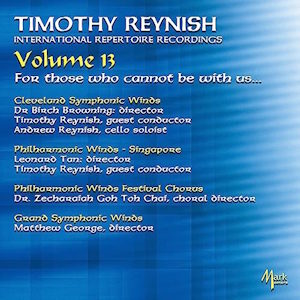
Timothy Reynish (conductor)
For those who cannot be with us…
Luis Serrano Alarcón (b. 1972)
Cello Concerto (2021)
Yasuhide Ito (b. 1960)
As Time Is Passing On (2000)
Chen Qian (b. 1962)
Ambush! From All Sides (2013)
Terence Greaves (1933-2009)
Werneth (2008)
Andrew Reynish (cello)
Cleveland Symphonic Winds
Philharmonic Winds & Philharmonic Winds Festival Chorus/Timothy Reynish
Grand Symphonic Winds/Mathew George
Cleveland Symphonic Winds/Birch Browning
rec. 2010/18
International Repertoire Recordings Volume 13
Mark Masters 56913-MCD [70]
Timothy Reynish is probably the British version of the American Frederick Fennell so influential has his influence been on the wind band movement in the UK. In 1977 he succeeded Philip Jones as Head of the School of Wind and Percussion at the Royal Northern College of Music; he retired from that post in 1998. He achieved great things there in developing the wind band in the UK, where it had mainly been the poor relation of the brass band. This series of wind band recordings which has been going over twenty years, covers a wide range of music championed by Dr Reynish and provides an invaluable resource for musicians looking to explore the repertoire.
I only know two other works for cello and wind, those by Jacques Ibert and Friedrich Gulda. I’m going to put my head on the block and say that while those works are interesting curiosities, the work by Luis Serrano Alarcón which opens the disc is a magnificent addition to the repertoire. It is one of a number of pieces commissioned by Reynish and his wife in memory of their son William who was killed in a rock-climbing accident in 2001 at the age of 34, but is also dedicated to their son Mathew, a cellist, who died in 2021. Reynish’s grandson Andrew plays the cello solo here.
In one tightly structured though multi-sectioned movement there is nothing funeral about the work, if anything what comes across is a celebration of life. it is immaculately scored using reduced wind forces with piano and percussion that mean that the soloist is never in danger of being overwhelmed. The cello part sounds grateful to play, the soloist having long singing melodies and fast skittering passages of brilliant finger work. Towards the end there is an impressive cadenza where piano and bells prove sympathetic partners. Andrew Reynish is a first-rate soloist while his grandfather provides a perfectly judged accompaniment. I was surprised to hear enthusiastic applause at the end so silent were the audience during the work.
Yasuhide Ito’s As Time Is Passing On, for wind band with mixed chorus is a curious work that could best be described as eclectic. In four movements, the first two Lamento and Marcia are instrumental while the third and fourth, Dies Irae and As time is passing on. have chorus added. Lamento provides a dark, brooding prelude to the work which uneasily modulates to the major and segues into a very British-sounding march. Walford Davies comes to mind, though no one more modern. For the choral movements we have a complete change of style. The Dies Irae, which follows the march without a break, sees part of the traditional text set to some very Andrew Lloyd Webber-sounding music with pounding drums and catchy rhythms. It is rather upbeat for a Day of Wrath, but it is over before we know it. It leads straight into the final section, Time Is Passing On which uses some verses by Nozomu Hayashi from his Twelve Requiems.It is probably the most successful movement with some really lovely writing for the chorus which reminded me of some of Bernstein’s choral musicand has some very imaginative scoring for the wind ensemble. Dr Reynish gets the Philharmonic Winds to play at an extraordinary pianissimo at the end when the chorus sings “requiem aeternam”. However, the final loud note from bells and the ‘whoosh’ from the bell tree seems unnecessary. The four movements do not really hang together as a unified work, and they could all have a better life individually. The last movement in particular seems to get to the core of the composer.
Chen Qian’s Ambush! From All Sides is based on a historical story picturing the battlefield of the decisive battle of Gaixia during which the Qin Dynasty (221-206 BC) was overthrown. The music uses traditional Chinese scales and sounds, textures and effects from Chinese Opera. It is a very successful work that never outstays its welcome. Anyone who enjoys the soundtrack to classic Kung Fu movies will find much to appreciate here. The singing, which I assume is provided by the band, is surprising and effective.
The disc ends with a five-movement suite by longtime faculty member of the Royal Northern College of Music, Terence Greaves. I have not been able to access the extended online notes mentioned in the liner notes so cannot give much information about this arrangement. It seems to have been assembled from works written as long ago as 1971 from something written for the BBC Midland Light Orchestra. It is all in a very English light music tradition and if you like Coates, Tomlinson or Binge you will find much to enjoy here. The final calypso would not be out of place in a work by Derek Bourgeois. It is very entertaining and expertly scored for band, though I am not sure if the arrangement is by the composer or another hand.
The sound quality of all the works, all from different times and locations, is surprisingly good, as is the playing from the various performers. The liner notes are less than ideal in both layout, content and printing. As I said earlier, a link to more detailed notes did not appear.
Paul RW Jackson
Buying this recording via a link below generates revenue for MWI, which helps the site remain free



















